
Who Could Be This Year’s De’Anthony Melton on Draft Night?
Taking a break from draft scouting to look at what is honestly a more realistic option with the 16th pick.
Daryl Morey is probably going to trade the pick.
As much as it would dismay both Mike and I, most reporting indicates that the Sixers are likely to move off the 16th overall pick in the upcoming NBA Draft. The team needs to win now, with Embiid squarely in his prime, and Maxey just now entering his, and odds are a proven veteran player helps you a lot more in the next three years than a 20 year-old out straight out of college.
Morey was already proven right in that line of thinking two seasons ago when he traded the 23rd overall pick in the 2022 NBA Draft — which became David Roddy — to the Memphis Grizzlies for De’Anthony Melton. Even after Melton all but lost his second season in Philadelphia due to injury, the deal was still a massive win for the Sixers. Memphis has already dealt Roddy to the Phoenix Suns for next to nothing, while Melton was a fantastic sixth man on a 2023 Sixers team that finished with the third-best regular season record in the entire NBA. If there’s no Tyrese Maxey, no prospect that falls past the lottery who your organization truly believes has plus starter or All-Star upside, moving the pick for a player who’s already shown they can hang in the NBA makes a lot of sense.
But who is a Melton-like target for the Sixers in this year’s cycle, then? Largely speaking, the most likely candidates are quality role players on teams that are at the very least trying to win games right now, but who, facing a likely salary crunch, might have to move off their young role players instead of offering them extensions.
Here are four different immediately helpful players who the Sixers might be able to trade for using the 16th overall pick in the NBA Draft:
Nickeil Alexander-Walker
Probably the most appealing option on this list, as Nickeil Alexander-Walker has made quite the name for himself this postseason. Highlights of him locking up Jamal Murray ran rampant across social media throughout the Minnesota-Denver series, and though he’s far from a perfect offensive player, he’s had several great moments either draining big shots or making incredible drive-and-kick passes.
Using the DARKO projections and application created by Kostya Medvedovsky and Andrew Patton, we can take a look at how each trade target’s career trajectory compares to Melton’s. Obviously, these projections are not absolute, but they are a useful tool in comparing players and understanding what can reasonably be expected in their future.
Alexander-Walker’s bizarre career is apparent in the above graph. All three of the Pelicans, Blazers, and Jazz essentially gave up on him through the first 3.5 seasons of his career before he found a home in Minnesota, and blossomed into one of the better point-of-attack defenders in the entire NBA. Add in the fact that he shot 39.1% from three this past season, and it’s easy to see him as the three-and-D guard capable of filling Melton’s shoes in Philly.
Personally, I’ve become a huge fan of Alexander-Walker due to his being one of the most ambidextrous players in the entire NBA, so much so that I wrote a full length article about it for Sporting News. Despite shooting with his right, Alexander-Walker almost always prefers finishing layups and throwing passes with his left hand. The crosscourt lefty skip pass has become his signature move while playing in Minnesota the past two years, and his ability to handle and create out of pick and rolls is something he offers that Melton never quite had in his bag.
If everything about Alexander-Walker sounds great up to this point, it’s reasonable to ask the following — why on earth would the Wolves trade him? Even as they’re likely going to be swept out of the conference finals by the Mavericks, Alexander-Walker was still integral to arguably their best season in franchise history. Moving off of Melton when the Grizzlies did wasn’t popular with their fanbase at the time, and it would probably be similarly criticized if the Wolves dealt NAW.
However, whereas Memphis was only staring down a financial crunch, Minnesota is already in one. The quartet of Anthony Edwards, Karl-Anthony Towns, Rudy Gobert and Jaden McDaniels is owed a whopping $158 million next year, all while the Wolves are locked in a messy ownership struggle, which could force the team into less-than-ideal trades in order to save some money.
The Wolves proved themselves as title contenders this season. Moving off any of their big four would be frowned upon. It would be potentially punting on a team that has extremely reachable title aspirations. Alexander-Walker is on a fantastic contract, as he’s only owed a little more than $4 million next season before he hits unrestricted free agency. Moving off him does little to alleviate Minnesota’s cap sheet, and losing a quality bench player could obviously hurt the team.
But maybe the Wolves look to get out ahead of not being able to re-sign Alexander-Walker to the large contract he’ll have earned by 2025, and sell high on him at the peak of his value. In which case, he’d be a perfect fit in Philadelphia.
Tari Eason
Tari Eason is a bit younger than the other trade targets, only having played two seasons for the Houston Rockets. A tenacious defender and rebounder who fills Melton’s role as a “makes stuff happen” guy, Eason’s career was off to a good start before a benign growth on his left leg bone ended his sophomore season (Unfortunately, a player having injury concerns also makes them a Melton-type).
One of the primary takeaways from the Sixers’ series loss to the Knicks was how much more athletic and twitchy each New York role player looked compared to those on the Philadelphia side. Injecting a player such as Eason into the mix would immediately remedy the issue. He attacks the ball in open space with a level of violence and energy that’s captivating to watch.
Again, it’s fair to ask — why would Houston want to trade their 6-foot-8, 23 year-old forward who plays defense like every second of the game is set to MF Doom lyrics? This past season, the Rockets finally turned a corner toward the right direction after finishing with the NBA’s worst record for three straight years. The team is chock full of young talents that Rockets’ brass likely hopes reaches All-Star level, from Jalen Green and Alperen Sengun, to Jabari Smith Jr. and Amen Thompson, and even Villanova’s own Cam Whitmore. Not to mention, Smith, Thompson, and Whitmore each overlap with some of the responsibilities that Eason is entrusted with on the court.
Their franchise is at a crossroads, where big decisions need to be made about how they want to build the team moving forward, including a decision over which of their young guys is the actual star to build around. Given the limited sample size they have of Eason, it’s hard to know exactly how he fits into their future plans.
It’s more likely than not the rebuilding team values a tall wing who isn’t the worst from behind the three-point line (34.7% in his career so far) and serves as a major plus on defense, but he’s far from an untouchable asset. Morey explained at the trade deadline when he justified trading former 28th overall pick Jaden Springer for “just” a second-round pick, most players can’t be traded for the equivalent value of the pick that was used to select them within 1-2 seasons of their career. In his eyes, getting any draft asset for Springer at that point in his career was still an organizational win.
Perhaps the Rockets don’t approach it the same way (odds are most general managers aren’t exactly the same as Morey), but maybe they do. Maybe trading what the player they used the 17th pick of the 2022 NBA Draft on for this year’s 16th pick (perhaps plus another smaller attached asset) is a win for them. There’s no way of knowing for sure, but should Eason come available for the 16th pick, the Sixers shouldn’t hesitate in sending it Houston’s way.
Isaac Okoro
Isaac Okoro seems like an odd inclusion for a number of reasons, chief among them that most Cleveland fans would probably be very content with the Cavs moving off of him this summer. Though the 2024 season was the best of his career, Okoro has still fallen short of the usual expectations given to a fifth overall draft pick, and currently sits as a 27.1% playoff three-point shooter. He’s a useful rotation player, but still a very flawed one who has hampered his team’s offense in the playoffs at times.
The other odd part behind Okoro’s inclusion is that he is hitting restricted free agency this summer, meaning it would be more likely for the Sixers to acquire him via sign-and-trade after the draft. In terms of his current standing with the Cavs, he’s not nearly as Melton-like as NAW or Eason.
But at just 23 years-old, Okoro is already an excellent defender who would immediately improve the overall athleticism in the Sixers’ rotation. He’s not quite at All-Defense level (being 6-foot-5 and not 6-foot-8 is the biggest thing holding him back there), but he’s still a menacing point-of-attack defender who constantly disrupts plays on the perimeter using his strength. After watching six games of the Knicks beating the Sixers to every loose ball and 50-50 play, Okoro could turn some of those in Philly’s favor.
He shot 39.1% from three during this past regular season, yet due to his low volume and hesitancy, teams still do not respect his shot, as evidenced by the way he’s defended in playoff settings. Okoro is acutely aware of this, and similar to Kelly Oubre, he’s developed some nice cutting instincts, taking advantage of plays where he’s ignored by his primary defender and slipping into open creases of the defense.
Okoro is probably the least desirable option on the list. As good as his best moments can be, he’s often far too limited on offense to play well in the most high leverage moments of the sport. Yet, every trade cannot be perfect, and of these four, he’s the most likely to move off his current team in the coming summer, and might have the most untapped upside should his shot ever fully develop. His career shifting into a Melton-like trajectory at this point is far from improbable.
Ayo Dosunmu
It’s really hard to predict what the Chicago Bulls are going to do. They should have blown up this team that’s destined to always be a 9-seed at each of the past two trade deadlines, yet have balked at each occasion.
Ayo Dosunmu was a spectacular second-round rookie for the Bulls in 2022, regressed slightly in 2023, but turned in a great 2024 campaign on the back of 40.3% three-point shooting. He’s the most proficient offensive player on this list, though also the least capable defensively. Dosunmu is a gamer in the most clichéd way possible. He doesn’t have any standout outlier traits, but he’s tall, quick, handles the ball well, shoots without fear, and always finds a good way to attack the defense.
His sophomore season struggles were almost all due to the Bulls trying to make him a full-time point guard and primary ball handler, which he most definitely is not. Similar to Melton, Dosunmu is a secondary/tertiary ball handler through and through. He can run your offense in spots, but will almost always look better attacking already created advantages, making him a pretty ideal fit next to a point guard like Tyrese Maxey.
The 24 year-old out of Illinois already signed a team-friendly contract that keeps him on Chicago’s books for just $7 million a year over the next two seasons. It would make a lot of sense for the Bulls to keep the younger, ascending player and move off their older, declining talent.
(Sidenote — Alex Caruso does not count as a Melton-type target. He’s far too good of a player for that. He’d command at least two first-round picks in a trade at a bare minimum).
But that was also the more logical move for them to make at the trade deadline – and yet they held pat. They did not sell Caruso at the peak of his value, they did not charge 50 cents on the dollar for DeMar DeRozan and they did not move off Nikola Vucevic last summer like most would’ve advised them to. So ultimately, it’s just hard to know what exactly Chicago wants to do. Again, maybe they find a case in selling high on Dosunmu and retooling around their “star” players, in which case the Sixers should jump at the chance to get him in the building.
Daniel Olinger is a writer for the Rights To Ricky Sanchez, and author of “The Danny” column, even though he refuses to be called that in person. He can be followed on X @dan_olinger.
“The Danny” is brought to you by the Official Realtor Of The Process, Adam Ksebe.


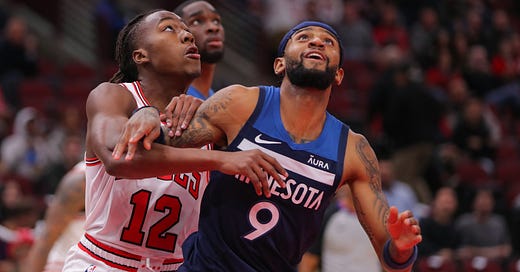




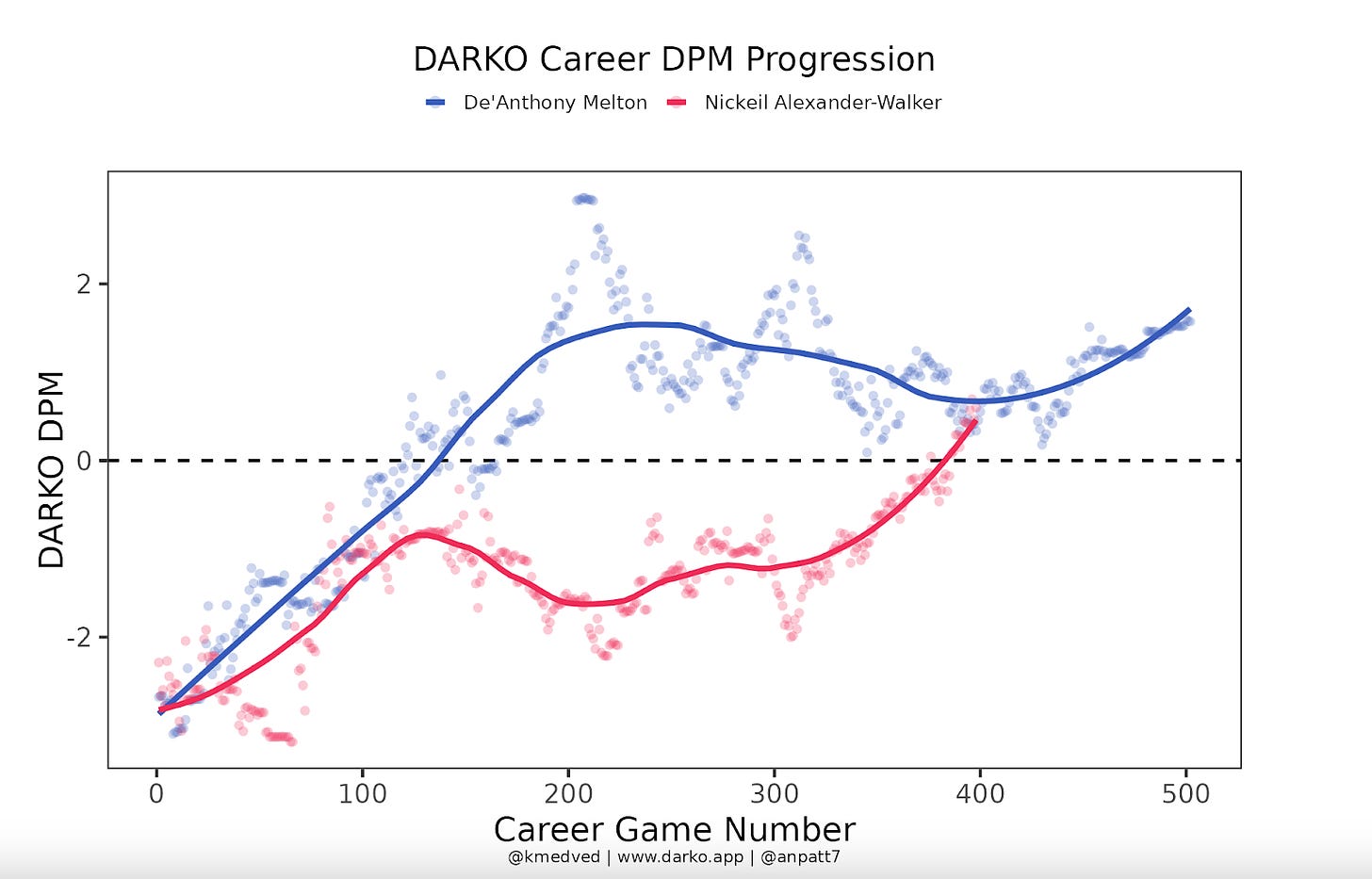
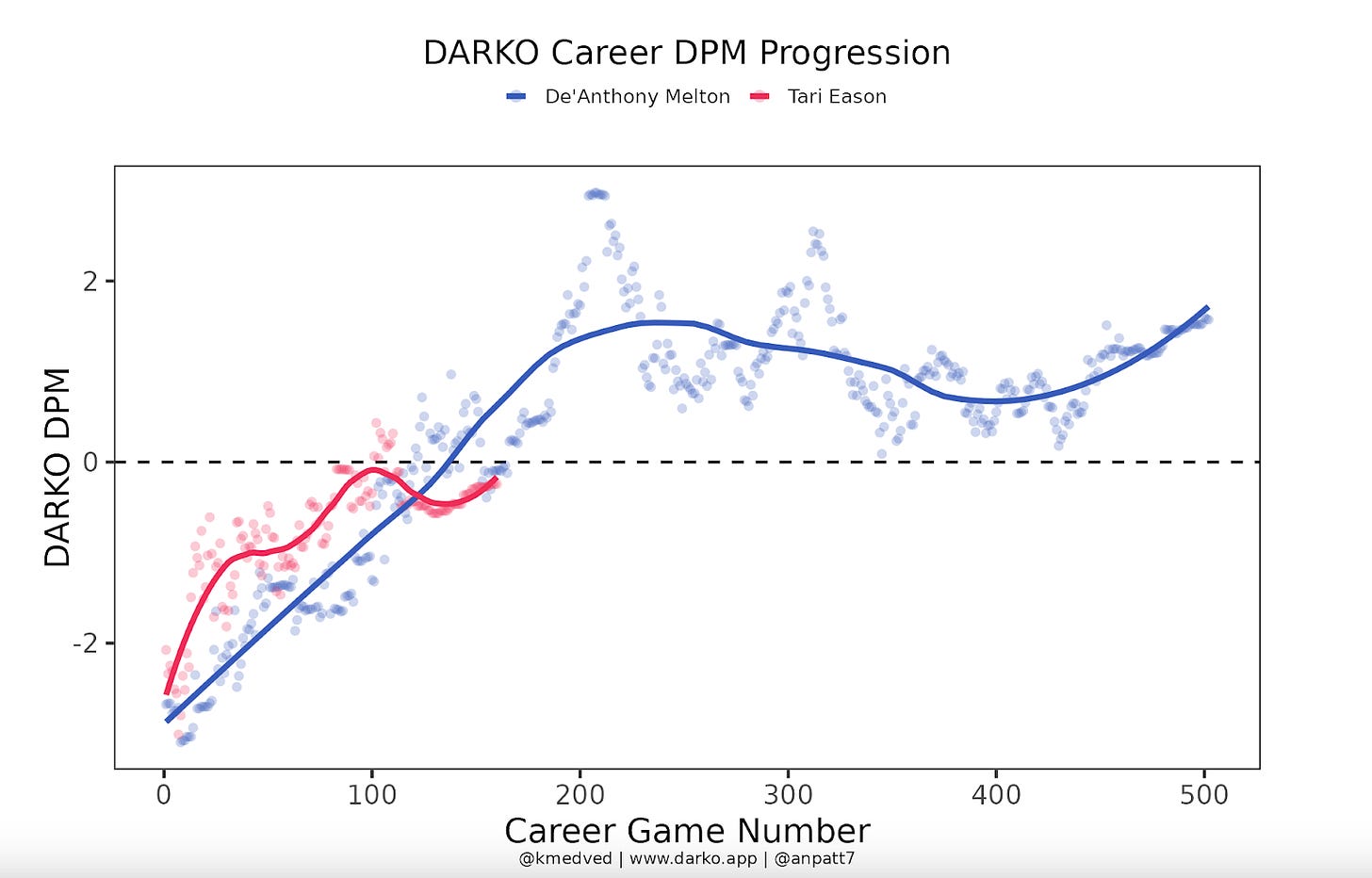
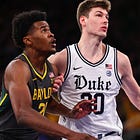
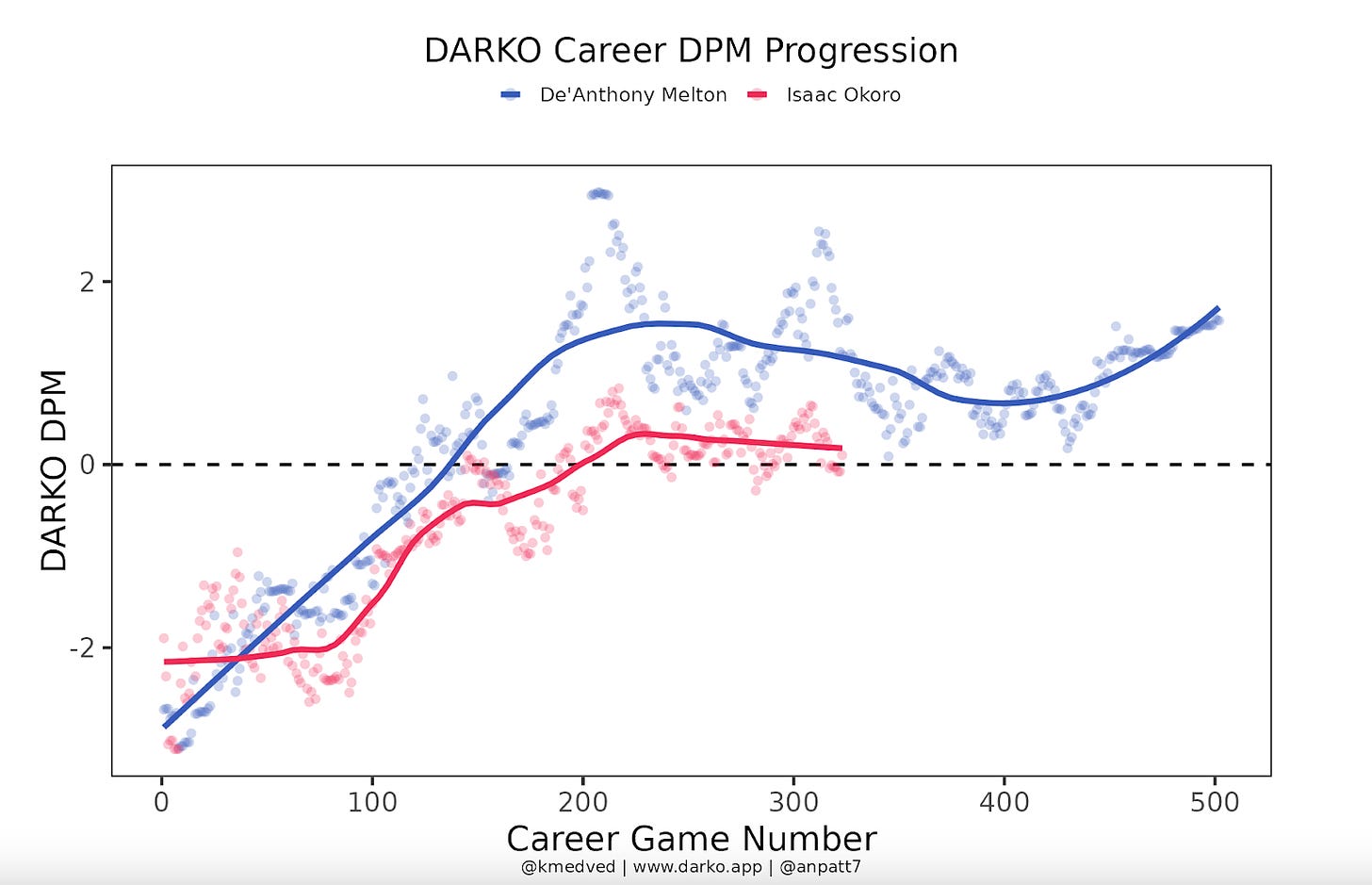
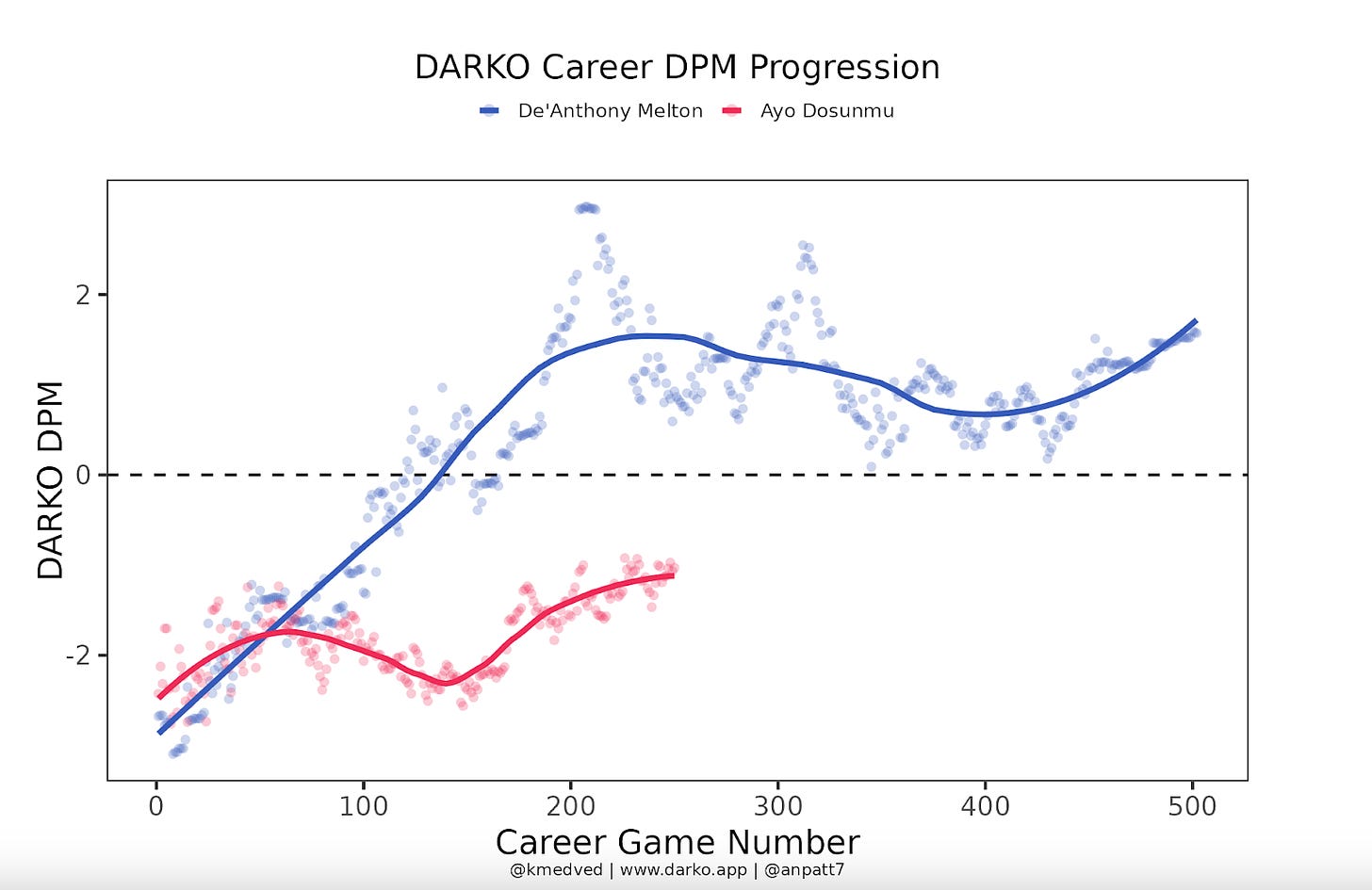






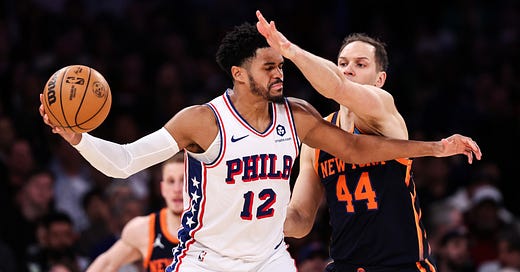



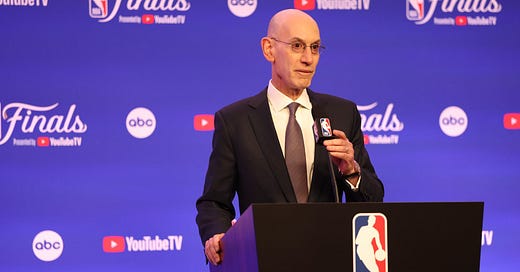

I like what you are doing here DO. Gives us sub radar options to review that have moderate to higher upside and don't fit the club they are on at present.